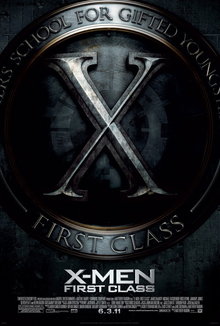X-Men:First Class E.C. blog
All of your HW needs to be turned in to receive credit for this blog.
I saw the movie this afternoon and was happy to see that the historical content wasn’t too battered and bruised. In fact, I was glad to see that the X-Men played such a pivotal role in preventing World War 3. However, there were a few things that I noticed that struck me as odd:
1. There was no civilian control of the military in either the Soviet Union or the United States. Sure, if you believe in conspiracy theories, this might be plausible. And yes, the military, especially under General Curtis LeMay was pretty much a war monger. But, I highly doubt that the American military decided to go to war by a show of hands. There was no sign of Kennedy or Khrushchev except in newsreel or TV footage.
2. Where was Castro’s role in any of the missile crisis stuff? Even when the sub and the Mockingbird crashed on the Cuban shore, even when both the Soviets and U.S. warships fired at the X-Men on the Cuban coast, the Cubans were invisible. 
3. This was something I noticed right away (so sue me!): the mini skirt hadn’t been invented yet by 1962. According to several sources I checked, it didn’t become popular until 1966. One of the main reasons I remember this was b/c I had associated the mini-skirt with the TV show, The Brady Bunch, which I had watched over and over as a kid growing up in the late 70s (and I knew the show had debuted in 1969, the year after I was born).
4. I was disappointed that the character named Darwin was killed off so quickly. It seemed that he was offed before he even got to develop – leaving a noticeably paler group of X-Men behind after Shaw’s attack. I wondered if this was some kind of attempt at irony – Shaw’s master race, Homo Superior, triumphant over a fellow mutant, and killing a number of other Homo Sapiens, in the attack on the CIA’s “secret HQ.” It was a pretty lame attempt at irony, and it just left the X-Men w/o a strong minority character.
Questions (choose 4 of 5):

1. How did Erik’s Holocaust figure into his quest to stop both the Soviet and American governments from destroying mutants? Explain.
2. Where did the movie deviate from history? At what point did you see fiction begin and non-fiction end (besides at the theatre door – suspend your disbelief in this case)? How many instances did you find? Explain.
3. What role did sexism play in the movie, both intentional and unintentional (maybe unintended by the filmmakers)? Use examples with Emma Frost, Moira MacTaggart, Angel and Raven. 
4. The mutant persecution has been a recurring theme throughout the X-Men series, both the films and comics. What could this discrimination be a metaphor in our society?
5. How do Erik and Charles’ different paths at tackling mutant discrimination resemble the two paths of the Civil Rights Movement in the 1960s? “I’m mutant, and I’m proud.” Explain.
Due Monday, June 13 before class.
